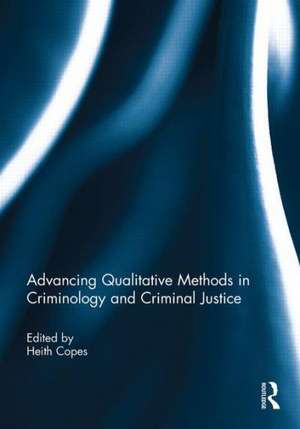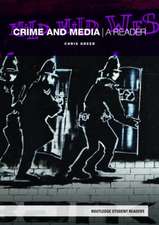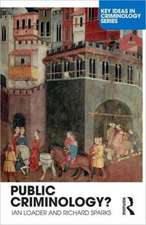Advancing Qualitative Methods in Criminology and Criminal Justice
Editat de Heith Copesen Limba Engleză Paperback – 31 mai 2013
This book was originally published as a special issue of the Journal of Criminal Justice Education.
| Toate formatele și edițiile | Preț | Express |
|---|---|---|
| Paperback (1) | 484.47 lei 6-8 săpt. | |
| Taylor & Francis – 31 mai 2013 | 484.47 lei 6-8 săpt. | |
| Hardback (1) | 1001.87 lei 6-8 săpt. | |
| Taylor & Francis – 16 sep 2011 | 1001.87 lei 6-8 săpt. |
Preț: 484.47 lei
Nou
Puncte Express: 727
Preț estimativ în valută:
92.70€ • 96.60$ • 76.76£
92.70€ • 96.60$ • 76.76£
Carte tipărită la comandă
Livrare economică 03-17 aprilie
Preluare comenzi: 021 569.72.76
Specificații
ISBN-13: 9780415845861
ISBN-10: 0415845866
Pagini: 192
Dimensiuni: 189 x 246 x 11 mm
Greutate: 0.34 kg
Ediția:1
Editura: Taylor & Francis
Colecția Routledge
Locul publicării:Oxford, United Kingdom
ISBN-10: 0415845866
Pagini: 192
Dimensiuni: 189 x 246 x 11 mm
Greutate: 0.34 kg
Ediția:1
Editura: Taylor & Francis
Colecția Routledge
Locul publicării:Oxford, United Kingdom
Public țintă
Postgraduate and UndergraduateCuprins
Introduction: Advancing Qualitative Methods in Criminal Justice and Criminology Heith Copes 1. The Prominence of Qualitative Research in Criminology and Criminal Justice Scholarship Richard Tewksbury, Dean Dabney and Heith Copes 2. Moving Beyond Our Methodological Default: A Case for Mixed Methods John J. Brent and Peter Kraska 3. Collecting and Analyzing the Stories of Offenders Lois Presser 4. What can ‘lies’ tell us about life? Notes towards a framework of narrative criminology Sveinung Sandberg 5. Finding Offenders: Exploring the Active versus Incarcerated Debate Heith Copes, Andy Hochstetler, Scott Jacques and Volkan Topalli 6. Exploring Strategies for Qualitative Criminological and Criminal Justice Inquiry Using On-line Data Thomas J. Holt 7. The Case for Edge Ethnography J. Mitchell Miller and Richard Tewksbury 8. Dangerous Intimacy: Toward a Theory of Violent Victimization in Active Offender Research Scott Jacques and Richard Wright 9. In the Classroom and on the Streets: How to Teach Qualitative Field Research to Criminology/Criminal Justice Graduate Students Robert G. Morris and James W. Marquart 10. On the Way to the Field: Reflections of One Qualitative Criminal Justice Professor’s Experiences Mark Pogrebin
Notă biografică
Heith Copes is Associate Professor of Criminal Justice at the University of Alabama at Birmingham, USA. His research interests include criminal decision-making as it relates to various types of illegal behavior including drug distribution, automobile theft and identity theft. His research has been published in a variety of journals, including Social Problems, the British Journal of Criminology, Deviant Behavior and Justice Quarterly.
Descriere
For several decades qualitative research has been under-represented in criminological and criminal justice research. This book is designed to promote the understanding of qualitative research designs and to encourage their use among those seeking answers to questions about crime and justice. It was originally published as a special issue of the Journal of Criminal Justice Education.












